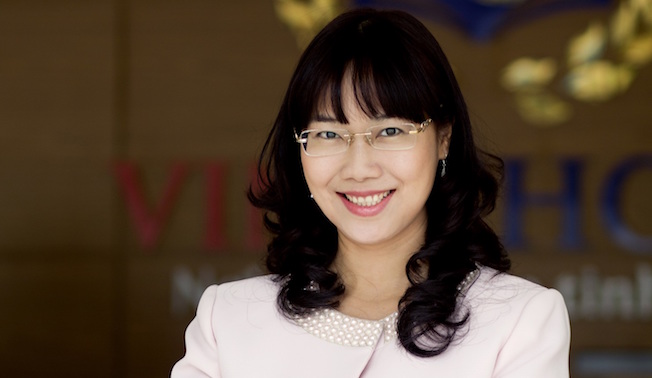When organic becomes an inspiring wellbeing lifestyle
For Tyna Huynh, co-founder of Drinkizz, organic is not just a food choice but a way of life that fosters a deep connection between people, nature and community.




VinUni students will have access to the Ivy League school's curriculum and training methods.

As reported, the Prime Minister approved the scheme on the establishment of building Vingroup's university called VinUni in Hanoi.
Le Mai Lan, Vice President of Vingroup, discussed with TheLEADER about differences VinUni will bring to its students compared to other international universities as well as expected tuition fees.
According to Vingroup, VinUni will be built in 2018. Can you share some information about construction site, scale and enrollment plan of VinUni?
Le Mai Lan: VinUni is located in Gia Lam district, Hanoi. The investment capital for phase 1, up to 2030 is estimated at VND5,000 billion (US$220 million).
In order to achieve the goal of contributing to Vietnam a world-class university, VinUni needs top-level partners in supporting the development of long-term strategies and transferring university management, teaching and research capacity.
A very important issue is the team building including the recruitment, training and development of faculty and researchers. Leading partners will help connect VinUni with leading professors in the areas of business, technology and health sciences.
Therefore, VinUni's policy is to cooperate strategically with elite universities in the top 20 universities in the world, focusing on the Ivy League which is the group of the most outstanding private universities of the United States such as the Cornell University and the University of Pennsylvania.
VinUni is expected to start construction in 2018 and officially enroll students in 2020.
It is known that the three key training areas of VinUni are business, technology and health science. What makes VinUni choose these three areas?
Le Mai Lan: In the near future, we focus on training three sectors including business, technology and health sciences. The specific disciplines focus on key areas Vietnam that has a potential to develop and has an urgent need to innovate in order to create a sustainable competitive advantage. There are tourism, real estate, retail, industry and public health.
VinUni will consider to open more training in other fields after being operational for a period of time.
What are the differences between VinUni and other international and domestic universities operating in Vietnam?
Le Mai Lan: As far as we know, there is no Ivy University that cooperates in training in Vietnam at the present time. Our partners, UPenn and Cornell, are not only University of Ivy but also in the top 20 in the world, which is an important and distinct advantage of VinUni since its inception.
The number of Vietnamese students to study abroad is quite large each year so do you have some reasons to persuade them to study at VinUni rather than study in foreign countries?
Le Mai Lan: When entering, VinUni students will have access to the training program and methods developed by the Ivy Schools, international standard teaching staff and the most advanced academic environment.
At the same time, VinUni students will have many opportunities for internships, practical experiences and interdisciplinary practice at Vingroup's ecosystems including Vinpearl, Vinhomes, VinMart, Vincom Retail, Vinmec, etc as well as at the leading businesses.
During the course of study, VinUni students will be continuously honored and perfected for their quality, bravery and real-life experience.
We believe that all of these advantages will open the door for VinUni students after graduation.
What does non-profit VinUni means? With this model, what is the expected tuition fee of VinUni compared to other international universities in Vietnam such as RMIT and Fulbright?
Le Mai Lan: A non-profit corporation is a company in which the shareholders are not entitled to the profits but reinvested to develop and serve the community. That does not means free of charge to the users.
According to this model, all business and operation of VinUni will continue as usual and the fees still follow the market practice.
Under the current law, non-profit companies only need to spend over 51 per cent of its profit on research, investment, development or service quality update.
However, the difference of VinUni is that we commit to spend 100 per cent of our profits for reinvestment activities to continuously upgrade and develop the system including investing in human resources development, facilities, equipment, scholarships, etc.
VinUni's tuition fees are consistent with the quality of the training program which is in accordance with international standards and based on the actual conditions of Vietnam.
The course fees are determined by specialization of training and fixed for the first enrollment course.
The tuition fees for the next courses will be adjusted according to the general principles and practices in the local and international schools.Scholarships and financial aid programs will ensure that excellent students are eligible for admission and development without being constrained by economic conditions.
For Tyna Huynh, co-founder of Drinkizz, organic is not just a food choice but a way of life that fosters a deep connection between people, nature and community.
Embracing respectful workplaces could very well be the key to unlocking a more prosperous future for Vietnam's garment industry.
Vietnamese businesses have had a long journey with great achievements, and this path will continue and blossom in years to come.
While some jobs are expected to be replaced by emerging AI applications, the technology is broadly seen as a catalyst for positive transformation in the workforce.
The energy transition is bringing forth new challenges, particularly in refining financial systems.
Alex Hambly talks about investment opportunities in Vietnam following his appointment as chief investment officer (CIO) of VinaCapital.